Larceny, Inc.

Brief Synopsis
Cast & Crew
Lloyd Bacon
Edward G. Robinson
Jane Wyman
Broderick Crawford
Jack Carson
Anthony Quinn
Film Details
Technical Specs

Synopsis
While in prison, convict J. Chalmers "Pressure" Maxwell turns down a proposal by fellow convict Leo Dexter to rob a bank after their release. Pressure intends to go straight and move to Florida to run a dog racing track together with his adopted daughter, Denny Costello, and old friends Weepy Davis and Jug Martin. After he is released from prison, however, Pressure learns that they will need $25,000 to go into business. Pressure tries to borrow the money from the bank, but as he has no collateral, the loan is refused. The frustrated Pressure then decides to rob the bank. With Jug's help, Pressure stages an automobile accident to raise the money to buy a failing luggage store next to the bank. The group only intends to use the store as a front while they tunnel through the basement into the bank vault, but Weepy succumbs to salesman Jeff Randolph's pitch and purchases a huge order of luggage. Denny, who is unaware of the robbery plan, is in the store when the luggage arrives and she persuades Pressure to keep it. Determined to help Pressure succeed, Denny and Jeff then concoct a series of promotional schemes which keep the store filled with customers as well as inhibit Jug's noisy tunneling activities. Meanwhile, the local merchants beg Pressure to ask the city to fix their torn-up street, which is keeping customers away. Pressure's half-hearted request so confuses the official in charge that the street is fixed almost immediately and business booms. Then bank officers, wishing to expand the bank's quarters, offer to buy the store. Denny encourages Pressure to sell, but before he can, Leo breaks out of prison and, having learned of Pressure's plans, tries to muscle in on the robbery. By this time, Pressure has become so successful in the luggage business that he has dropped his plans for the robbery, but Leo insists that they dynamite the wall between the bank and the store anyway. Pressure tries to delay the explosion until he can resell the store to Homer Bigelow, its former owner. On Christmas Eve, the night set for the explosion, Homer, Pressure and Leo are all in the store. Leo knocks Homer unconscious, but he manages to push the burglar alarm before he collapses. When Pressure stops Leo from shooting Homer, Leo also knocks him unconscious and runs out of the store, where the police are waiting for him. The store catches fire and Pressure saves Homer from the flames. Now a hero, Pressure makes plans for a new, larger luggage store, and Denny accepts Jeff's marriage proposal.

Director

Lloyd Bacon
Cast

Edward G. Robinson
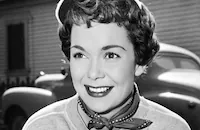
Jane Wyman
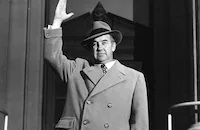
Broderick Crawford

Jack Carson

Anthony Quinn

Edward Brophy
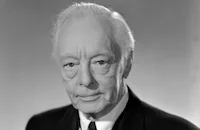
Harry Davenport

John Qualen
Barbara Jo Allen
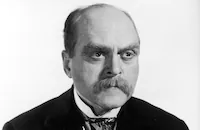
Grant Mitchell

Jackie C. Gleason
Andrew Tombes
Joseph Downing

George Meeker

Fortunio Bonanova

Joseph Crehan
Jean Ames

William B. Davidson
Chester Clute
Creighton Hale
Emory Parnell
Joe Devlin
Jimmy O'gatty
Jack Kenny
John Kelly
Dutch Hendrian
Bill Phillips
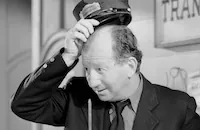
Hank Mann
Eddie Foster
Cliff Saum
Charles Sullivan

James Flavin
Eddy Chandler
Frank Mayo

Charles Drake
Ray Montgomery

Lucien Littlefield

Jack Mower
De Wolfe Hopper

Grace Stafford
Wallace Scott
Fred Kelsey
Philo Reh
Fred Walburn
Janice Ohman
Don Barclay
Arthur Q. Bryan
Harry Hayden
Pat O'malley
Harry Strang
Ted Oliver
Vera Lewis
Roland Drew
Kitty Kelly
Jean Maddox
Crew
Milo Anderson
Hugh Cummings
Ralph Dawson
Adolph Deutsch
Leo F. Forbstein
Everett Freeman
Tony Gaudio
Edwin Gilbert
John Hughes
Dick Mayberry
Jack Saper
Dolph Thomas
Jerry Wald
Perc Westmore

Photo Collections
Videos
Movie Clip





Trailer
Hosted Intro
Film Details
Technical Specs

Articles
Larceny, Inc.
Adapted from the Laura and S.J Perelman Broadway farce The Night Before Christmas, the story casts Robinson as "Pressure" Maxwell, a convict days away from his release from Sing Sing, who has vowed to go straight. His fairly dense fellow parolee Jug Martin (Broderick Crawford) is ready to go straight as well, and the two make plans to open a dog track. Determined to make a go of it, they pass on the invitation of fellow inmate Leo Dexter (Anthony Quinn) to lay the groundwork for a bank job that he's anxious to pull upon release.
Once back in the real world, however, the two ex-cons receive a shock, as their partner Weepy (Edward Brophy) has sold off the slot machines necessary for their new enterprise. Desperate for cash, they decide to co-opt Dexter's plan without his involvement. First, they purchase the small luggage store adjacent to the targeted bank, maintaining the business's facade while covertly attempting to tunnel into the adjoining basement.
However, the unanticipated amount of traffic and success that the bogus storefront generates prompts Pressure to ask his unsuspecting niece Denny (Jane Wyman) to manage the store. Delighted that her uncle seems genuinely determined to go legit, she accepts, and before long she's being charmed by fast-talking valise vendor Jeff Randolph (Jack Carson). Matters come to a head when news of the scheme gets back to Dexter, and he breaks jail in pursuit of his cut.
Larceny, Inc. is bolstered by Warner's usual array of distinguished character players, including Harry Davenport, John Qualen and Grant Mitchell; Jackie Gleason can also be seen in an early role. In terms of critical reception at the time of its release, Larceny, Inc. did not enjoy as favorable a reception as the other Robinson/Bacon crime comedies, but it has its admirers. Woody Allen paid it affectionate homage, lifting the film's basic premise for Small Time Crooks (2000).
Producer: Jack Saper, Jerry Wald, Hal B. Wallis
Director: Lloyd Bacon
Screenplay: Everett Freeman, Edwin Gilbert, Laura Perelman (play), S.J. Perelman (play)
Cinematography: Tony Gaudio
Film Editing: Ralph Dawson
Art Direction: John Hughes
Music: Adolph Duetsch, Howard Jackson, William Lava, Heinz Roemheld, Max Steiner
Cast: Edward G. Robinson (J. Chalmers Maxwell), Jane Wyman (Denny Costello), Broderick Crawford (Jug Martin), Jack Carson (Jeff Randolph), Anthony Quinn (Leo Dexter), Edward Brophy (Weepy Davis).
BW-96m. Closed captioning.
by Jay S. Steinberg

Larceny, Inc.
Quotes
Trivia
Notes
The film's working titles were The Night Before Christmas and A Night Before Christmas. Broderick Crawford was borrowed from Universal for this film.

Miscellaneous Notes
Released in United States 1942
Released in United States 1942

















